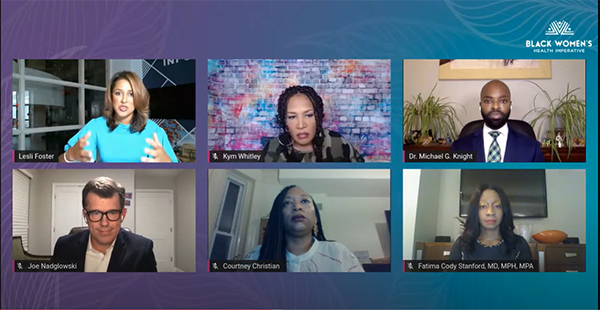
This past week, OAC’s President and CEO, Joe Nadglowski, took part in a panel discussion hosted by the Black Women’s Health Imperative about understanding and addressing obesity in black women.
The panel also featured a number of esteemed voices and experts from the black community:
- Linda Goler Blount, MPH | President and CEO of the Black Women’s Health Imperative
- Lesli Foster | WUSA9 Weeknight Anchor
- Kim Whitley | Actress, Comedian
- Fatima Cody Stanford, MD, MPH, MPA | Obesity Medicine Physician at Massachusetts General Hospital and Harvard Medical School
- Michael Knight, MD | Obesity Medicine Physician at George Washington University
- Courtney Christian, MPA | Senior Director of Policy and Research at PhRMA
Understanding Black Women’s Experiences
While we know that nearly 100 million Americans are affected by obesity, the reasons why do not look the same for everyone. And to that note, standard ways of preventing and treating obesity should not be the same across the board, either.
This is especially important when understanding the experiences of black women in the U.S. who are affected by both racial and gender discrimination. As the panel uncovered, these experiences can affect weight and health at the DNA level.
A Quick Overview:
- 4 out of 5 black women in the U.S. struggle with overweight or obesity.
- For black women, “lack of self-control” is often cited for weight struggles by healthcare providers and society in general. This is not just a form of racial and gender bias, but also weight bias.
- Black women have, on average, about 15% more cortisol in their bloodstream at any given time as compared with white women. Chronic stress and daily interactions with racism can contribute to weight issues by affecting how the body stores fat.
A Different Way of Approaching Obesity
An important take-home message from this panel was that social determinants of health play a crucial role in weight – especially when looking at weight and obesity in black women.
Factors such as access to fresh and healthy foods, a safe place to walk outside, and access to healthcare services can all affect weight and health. So can our personal lived experiences such as our relationships with food, movement, family, and the many challenges we face in life.
For this reason, the panel addressed a number of other important take-home messages about how we should address obesity – not just in black women, but across the board:
- Access to healthcare and accurate, unbiased health education is crucial.
- When healthcare providers are free of weight bias, they can more effectively help their patients manage their weight and health.
- “One size does not fit all” when it comes to obesity treatment and weight management. These efforts must be personalized to meet a patient’s unique needs and experiences.
- Access to a range of obesity treatments and services is critical. These can include help with behavior modification, community-based programs, FDA-approved medications, bariatric surgery, and others. One way we can do this is by supporting the Treat and Reduce Obesity Act.
- Managing your weight can take a village and support is crucial. Instead of stigmatizing people for their weight or sabotaging them, we need to be there for them.
To see the full BWHI panel discussion, Click Here to watch on YouTube.
